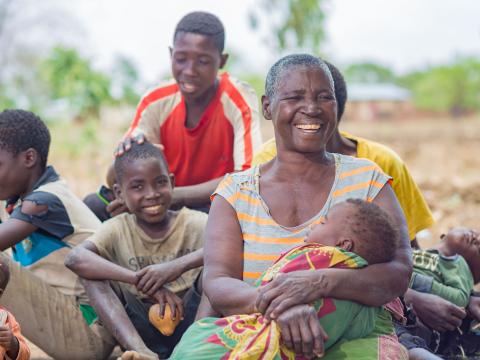Balaka cuts malaria Rate by half with Indoor Residue Spraying (IRS)

With a population of over 500,000 people, Balaka district in Malawi has been grappling with malaria higher incidence rate.
As such, families like that of 69-year-old Margaret Chanunkha spent much time in the hospital nursing a sick grandchild due to malaria.
“Because of Malaria in this community, I used to be in and out of the hospital trying to get my family some medication relief from Malaria, so there was little I was doing to earn an income to support my family,” says a single granny looking after seven grandchildren now.

When Indoor Residue Spray (IRS) came into our community to reduce the mosquito-bite-induced sickness, some quarters said the fumigation was aimed at making sexually active adults sterile, as such very few people had their houses fumigated, but Chanunkha’s malaria predicament made her quickly jump on.
“When the IRS came in 2020, I had no hesitation to participate because I want to rid my household of malaria incidences, so I got my house sprayed,” she says.
“So since I started getting my house sprayed, I have seen that my grandchildren rarely fall ill of malaria and it has been a while since I went to the hospital for malaria treatment because of IRS,” adds Chanunkha.

Today Chanunkha’s grandchildren easily go to school as she also concentrates on her farming chores to help the family produce enough food on their homestead.
Moses Mtakaira, Balaka District Malaria Coordinator says the IRS exercise has helped pull the district out of the high malaria prevalence burden zone.
According to Mtakaira, the IRS has reached 95 percent of the housing structures eventually cutting malaria incident rate by half by reaching out to over 500,000 people in the district.
“We are glad to report that, as a district, we have had reduced malaria incident rate because of the IRS exercise. Before IRS in 2019, the malaria incident rate was at 486 per 1000 population, but that has since been reduced to 211 incidences now, so we are so glad that we have effectively reduced malaria incidences in Balaka with World Vision-Global Fund supported IRS,” says Mtakaira.

Mtakaira also praises the project for reducing pressure on resources used to treat malaria cases which he says will be directed to other equally pressing needs at the district health office.
“Because of reduced malaria incidences, we treat far fewer cases in health facilities than before, and this means less expenditure on malaria-related drugs, hence saving money and other resources we could use for other purposes as we strive towards reaching the Balaka population with quality health care,” he explains.